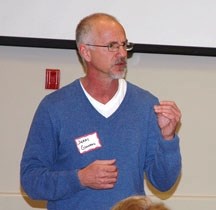Building an atmosphere of trust is one of the most important things adults can to do help young people reach their full potential, an international outreach worker said in Okotoks last week.
Jerry Goebel, author and director of One Family Outreach, encourages the development of what he calls Intergenerational Communities of Intentional Courtesy. The focus of the idea is help build trusting relationships with and around young people, particularly among adults.
On March 30 at the Foothills Centennial Centre Goebel spoke to a group of about 50 people representing various sectors, including education, social and health groups as well as individuals who work with young people in the community.
Goebel said engaged youth emerge from communities of adults who trust each other.
“Research tells us that if adults trust each other, children excel,” said Goebel, who is based in Regina and speaks across North America.
He said high achievement in test scores is tied to trust among adults.
Goebel pointed to a study called “Trust in Schools” which looked at 400 schools and compared the highest achieving schools with the lowest achievers. It found the high achieving schools had trust in adults, whereas low achieving schools did not.
“We can talk all we want about curriculum, all we want about technology, all about social economics, but if we don’t have trust among adults in our schools then our children are not going to achieve,” he said.
According to Goebel, it’s an approach that can be applied in all areas of childhood and youth development and it’s for all youths, not just the so-called trouble kids.
However, he said adults need to focus as much on themselves and what they are doing and how they are interacting as they do on what they are doing to help young people.
In the end, Goebel said it’s something that also makes sense at a dollars and cents level. He said it costs $120,000 to incarcerate a young person in Canada for a year and the money would be much better spent in other areas, such as education.
Yet, Goebel said the focus of Canada’s education system needs to change as well.
He said the Gates Foundation, created by Microsoft founder Bill Gates, has redefined the three R’s for education to Rigor, Relevance and Relationships.
“We’re focusing on rigor, but you cannot sustain rigor without relevance and you only get relevance through relationship,” said Goebel.
He said it starts with helping adults learn to build relevance into their interactions with young people so they learn why things are important, particularly in school. For example, he said the number one reason young people leave school is they don’t see it as relevant.
“They don’t see any reward in our goals, they don’t see efficacy in our goals,” said Goebel.
As well, he said education needs to shift its attention to focus on what people do best rather than where one struggles.
“There’s a glass ceiling with criticism, you can only improve productivity so much by focusing on criticism, 17 per cent and then it falls back down,” he said. “By focusing on strengths, you can actually reduce disengagement from 40 per cent to one per cent.”
Goebel said it all comes down to the fact we live in an innovation-based society and youths have to be prepared to lead.
This is going to be critical for Canada’s future international success, he said.
“The country that’s graduating the most masters in information technology is India and they’re willing to start work at $8,000 a year,” he said. “Do we want to compete in information? Where we want to compete is innovation and innovation requires discipline and synthesis of information and it requires thinking with the whole brain instead of with memorization.”
Goebel said Canada is not producing innovators whereas producing innovators will help create entrepreneurs and employers.
Terry Dauter, community connections worker at St. Luke’s Outreach Centre, uses the model in her work at the centre.
She said it has been empowering for the young people she works with.
“I’ve worked with Jerry’s material specifically for years and why it works is it looks at the whole child and it looks at everything they need to do to be engaged in their community, to be healthy and care for each particular aspect of themselves,” said Dauter.
She said traditional schools haven’t worked for her students, so there’s little point in following in the same manner.
“We’re looking for ways to engage them and empower them to make them feel like they belong,” said Dauter.
Ultimately, she said the focus needs to shift to figuring out ways to leverage young people’s strengths to get the most out of them.
Dauter’s focus is on creating an environment where students who have been marginalized elsewhere can become leaders in the school.
“We give them an opportunity to be heard,” she said. “We value their voice, we value their lessons.”




